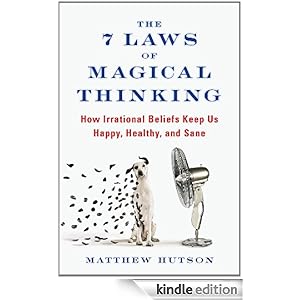There would seem to be two salient points to be taken away
from Matthew Hutson's explanation of what he calls The Seven Laws of
Magical Thinking. First of all
you, I, we all engage in some if not all aspects of magical thinking, even
those of us who would scream the loudest, "No way!" Second, that it's a good thing. Thus the tome's subtitle: How
Irrational Beliefs Keep us Happy, Healthy, and Sane.
Hutson begins by defining magical thinking. "There's a world of the mind, defined by
matter and deterministic forces. But we
instinctively treat the mind as though it had physical properties. . . . We
perceive mind and matter mingling together, working on the same
wavelength." Magical thinking is
the "mingling of psychological concepts with physical ones." The book that follows is essentially a
collection of examples and anecdotes illustrating the author's catalogue of seven
different kinds of magical thinking. The
illustrations are drawn from history and current events; they are drawn from
scientific experimentation and a few are even culled from the world of
fiction. Some of the examples are
fascinating, some less so; some are convincing, some more of a stretch—but
taken as a whole, Hutson makes his points forcefully and with wit.
On the most obvious level he talks about things like the
tendency of pet owners to endow their pets with human qualities and the belief
that there are objects that can bring us good fortune or bad luck. More controversial, especially to believers,
would be the belief in a divine being that can exert control over human affairs
or the ascription of emotions and feelings to the human fetus. Somewhere between extremes, he suggests that
the use of metaphoric comparisons like angry sea and raging storm indicate a
kind of unconscious ingrained magical thinking.
In almost all cases he points to psychological experimentation which
supports not only the idea that such magical thinking exists, but that it can
in fact have significant positive value.
For example, he sites experiments that have demonstrated that people who
attribute events to a divine agency are better able to deal with the evils that
life throws their way.
Perhaps the most interesting reading in the book is the
least scientifically convincing and that is the anecdotal material. In one of the earlier chapters in which he
discusses the idea that physical objects have essences that can be transferred,
he talks about the effects that people felt when the piano on which the
assassinated Beatle, John Lennon, composed "Imagine" toured the
country after his death. People claimed
that they could feel the man's presence in the piano. There are the stories of hospital patients
rehabbing with the aid of robotic pets and amputees who can still feel their
lost limbs. There is the story of the
construction worker who tried to jinx the Yankees by burying a David Ortiz
jersey in the concrete of their new stadium. The book is filled with these
kinds of stories to dine out on.
The uses of such magical thinking are varied. It can help us
deal with our fears of the unknown. It
can give us intimations of immortality and provide a rationale for altruistic
actions. It can help us to come to terms
with our bodies and their often disgusting functions. It can allow us to feel superior to fellow
creatures. One only has to think back to
the 19th century Industrial Revolution to see how magical thinking
persuaded many to believe that products made by the hand of a man were superior
to those made by the new machines, because a man could infuse his work with his
passion for what he does, while a machine could only manage sterile
perfection. Indeed imperfection, as in
Ruskin's praise for the great Gothic cathedrals, was an indication of a
building's greatness, because it was an indication of the human touch.
"Whether magic exists or not," Hutson concludes,
"magical thinking got us where we are, and for better or worse, it will
take us where we're going. We could no
sooner escape it than we could escape consciousness. We think, therefore we think magically."


No comments:
Post a Comment